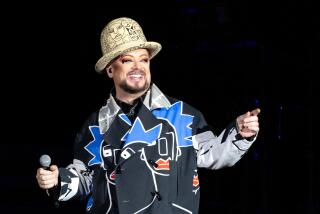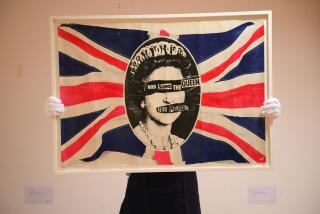An Affection for the Teen Condition : Pop Music: Teenage Fanclub’s members are kindred spirits. The band plays at Fairfax High School tonight.
Brendan O’Hare, drummer of the Scottish band Teenage Fanclub, had a little misconception about the group’s concert tonight at the Fairfax High School auditorium.
“I think it’ll be fun to play an all-girls’ high school,” he said by phone from his home in Glasgow.
It was almost a shame to break the news that Fairfax is co-ed.
“Well, that’s what we were told,” he said, sounding slightly crestfallen.
But he shouldn’t be too sad. All-girl or co-ed, there could hardly be a better place for this band to play than a high school. Rarely has a pop group come equipped with a more perfect name than Teenage Fanclub, not so much because it has teen fans, but because the group’s members are fans of teens: Few bands have ever written with so much affection for the teen-age condition--especially the role that rock plays in it.
And it’s not just that the band writes about teen spirit. It’s lived it. The pop-worshipping characters in such songs as “The Concept” and “Metal Baby”--both found on the Fanclub’s U.S. debut album, “Bandwagonesque”--follow in the grand tradition of Chuck Berry’s “Sweet Little Sixteen” and David Bowie’s “All the Young Dudes.” Except for the gender, the songs’ themes could be the story of the band itself.
“It’s quite funny--’Metal Baby’ is about a guy taking a girl to a show, but she runs off with the band,” O’Hare, 22, said. “I ran off and became the drummer.”
O’Hare, who was introduced to rock when his older brother bought the Sex Pistols’ “God Save the Queen” single in 1977, was just 15 when he began haunting the Glasgow rock clubs. There he became a fan of a band called the Boy Hairdressers, which included singer-guitarists Norman Blake and Raymond McGinley.
When that band split up in 1989, O’Hare crossed the line from fan to colleague, joining the pair’s new band, which also included singer-bassist Gerry Love. From there it was a story itself worthy of being celebrated in song.
A 1990 independent debut album, “Catholic Education,” earned the Fanclub accolades in the British rock press, and that summer the band made a splash in its first U.S. appearances at the New Music Seminar in New York. Geffen Records’ DGC label, which was gaining a reputation as the place for hip up-and-comers, signed the band. After one more independent release (the all-instrumental “The King”), DGC issued “Band-wagonesque,” which even before it was in stores was hailed by Spin magazine as the best album of 1991.
And now O’Hare finds himself on the other side of the teen worship.
“Down in front at all our shows are at least 10 girls that ‘Metal Baby’ could have been written about, and maybe 100 in the audience,” he said. “It’s quite amusing, but I guess bound to happen.”
Now the band is hard at work maintaining that teen innocence, even as it becomes the object of teen worship. The group recently fired its manager and will now handle its own affairs, with an all-for-one attitude--all four members do interviews with none identified as the leader.
O’Hare hopes that the group’s young fans will also try to hold on to their youthful ideals.
“A lot of people are afraid to get older,” he said. “When you’re 15 you want to be 21, but you want to stay 15, too. So don’t worry about nothing. Join a band. It’s a good thing to do. That’s what I did and it worked. It’s a good way to make money and enjoy it--not that much money, though.
“But none of us have any message for young people. . . . Um, look both ways before you cross, don’t be cheeky to your parents. We’re not a very rock ‘n’ roll band. We don’t take drugs and we don’t try to corrupt young people. Sad, really, but true.”
More to Read
The biggest entertainment stories
Get our big stories about Hollywood, film, television, music, arts, culture and more right in your inbox as soon as they publish.
You may occasionally receive promotional content from the Los Angeles Times.






